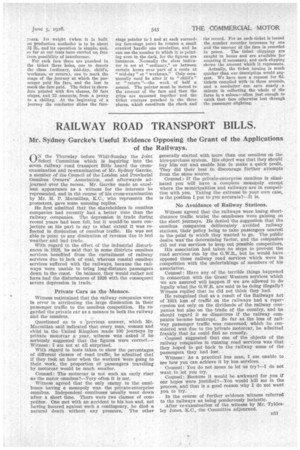RAILWAY ROAD TRANSPORT BILLS.
Page 57

If you've noticed an error in this article please click here to report it so we can fix it.
Mr. Sydney Garcke's Useful Evidence Opposing the Grant of the Applications of the Railways.
rIN the Thursday before Whit-Sunday the Joint Select Committee which is inquiring into the seven railway road transport Rills heard the crossexamination and re-examination of Mr. Sydney Garcke, a member of the Council of the London and Provincial Omnibus Owners' Association, and afterwards adjourned over the recess. Mr. Garcke made an excellent appearance as a witness for the interests he represented, and in the course of his cross-examination by Mr. H. P. Macmillan, K.C., who represents the promoters, gave some amusing replies.
He first admitted that the shareholders in omnibus companies had recently had a better time than the railway companies. The depression in trade during recent years had been felt, but it would be mere conjecture on his part to say to what extent it was reflected in diminution of omnibus traffic. He was not able to point to any diminution of revenue due to bad weather and bad trade.
With regard to the effect of the industrial disturbances in 1926, he said that in some districts omnibus services benefited from the curtailment of railway services due to lack of coal, whereas coastal omnibus services suffered with the railways, because the railways were unable to bring long-distance passengers down to the coast. On balance, they would rather not have had the disturbances of 1926 with the consequent severe depression in trade.
Private Cars as the Menace.
Witness maintained that the railway companies were hi error in attributing the large diminution in their passenger traffic to the omnibus competition. He regarded the private car as a menace to both the railway and the omnibus.
Questioned as to a 'previous answer, which Mr. Macmillan said indicated that every man, woman and child in the United Kingdom made 100 journeys by private motorcar a year, witness was asked if he seriously suggested that the figures were correct.-Witness: I am not at all surprised.
With regard to tests taken to show the percentages of different classes of road traffic, he admitted that if they took an hour when the workers were going to their work, the proportion of passengers travelling by motorcar would be much smaller.
Counsel: The motorcar is not such an early riser as the motor omnibus1—Very often it is not.
Witness agreed that the only enemy to the omnibuses having a monopoly was the private-enterprise omnibus. Independent omnibuses usually went down after a short time. There were two classes of competitor. One met with an accident to his bus and, not having insured against such a contingency, he died a natural death without any pressure. The other generally started with more than one omnibus on the hire-purchase system. His object was that they should buy him out and enable him to make a quick profit. They did their best to discourage further attempts from the same source.
Counsel:, If the private-enterprise omnibus is eliminated you will have a complete monopoly except where the municipalities and railways are in competition with you. Taking the extreme in your own case, is the position I put to you accurate?—It is.
No Avoidance of Railway Stations.
Witness agreed that the railways were losing shortdistance traffic whilst the omnibuses were gaining on the short journeys. He denied the suggestion that the omnibus companies deliberately avoided railway stations, their policy being to take passengers nearest to the point to which they wanted to go. The public desire was' the determining factor, and the companies did not run services to keep out possible competitors.
His association had taken no steps to prevent the road services run by the G.W.R., but he would have opposed those railway road services which were In competition with the undertakings of members of his association.
Counsel: Have any of the terrible things happened in connection with the Great Western services which we are assured will happen if we are allowed to do, legally what the G.W.R. are said to be doing illegally? Witness replied that he did not think they had.
He recognized that as a result of the Railways Act of 1921 loss of traffic on the railways had a repercussion not only on the dividends of the railway companies but also on the trade of the country, and he should regard it as disastrous if the railway companies became bankrupt. So far as the loss of railway passenger traffic was concerned, which he considered was due to the 1)rivate motorcar, he admitted frankly that he could find no remedy.
Counsel suggested that one of the objects of the railway companies in running road services was that they hoped to get back to the railway some of the passengers they had lost.
Witness: As a practical bus man, I am unable to see how you can achieve it by bus services.
Counsel: You do not mean to let us try?-1 do not want to let you try.
Counsel:, Because it would be awkward for you if our hopes were justified?—You would kill me in the process, and that is a good reason why I do not want you to try. In the course of further evidence witness referred to the railways as being ponderously inelastic.




















































































































